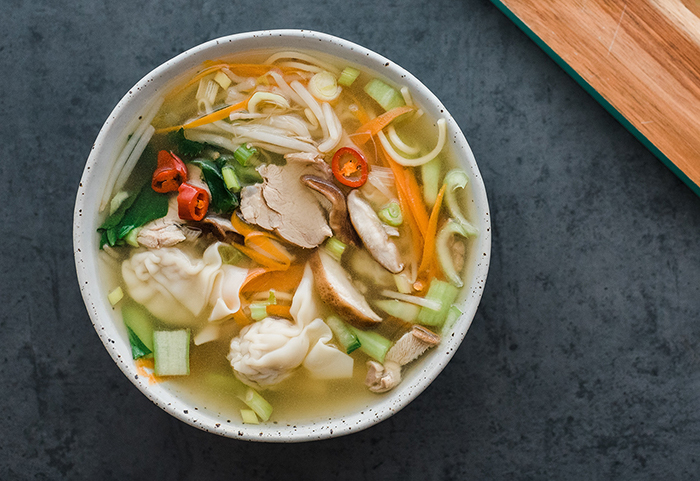Simply Central: the surprising science of soup
Mary Hinsen
15 May 2021, 3:51 PM
 My mother’s soup always made me feel better – there’s now science behind soup’s feel-good factor. Photo Mary Hinsen
My mother’s soup always made me feel better – there’s now science behind soup’s feel-good factor. Photo Mary HinsenScience is now confirming what our grandmothers and mothers already knew – soups are not only comforting, they’re also good for your health.
Simply Central is a home and lifestyle series for your Sundays. We take a look at what’s hot, what’s not, and everything lifestyle.
With cooler mornings and winter on its way, I was asked to share a recipe for warming soup. I tend not to follow a recipe, but I do have a few go-to methods I use as my secret to amazing soups.
I’m happy to share.
First, I save the bones from roasts and boil them up to extract flavour, the last bits of meat left on the bone and that luscious meaty goodness.
I then strain everything to extract the stock, and add any delicious meaty chunks back in. I freeze it in one cup quantities for use later.
Second, when making soups I always fry the veggies first.
I take a glug of extra virgin olive oil, and fry my chosen veggies for a few minutes in the soup pot. I add salt, pepper and other spices during frying; this intensifies the flavours, gives a wonderful savoury taste and I don’t need to add as much salt. After frying, that’s when I add stock.
Veggies can be leeks, carrots, celery tops, anything in season. Basically, you can use any veggies you like – I use whatever’s in the fridge – and frying turns them into a delicious soup taste sensation.

Chilli chicken soup is a winter go-to in our house.
I discovered there’s actually a scientific basis to what I do and the results I get – it seems my grandmother and my mother really did know best!
In 2000, the American College of Chest Physicians published findings stating there is scientific validity to chicken soup reducing cold symptoms.
Soups tested by the researchers were made to ‘Grandma’s recipes’ with chicken and vegetables, and were compared with the effects of soups you can find in the supermarket. Findings showed that the home-made chicken soup did indeed have health benefits:
“Chicken soup may contain a number of substances with beneficial medicinal activity, including an anti-inflammatory mechanism that could ease the symptoms of upper-respiratory-tract infections.”
However, they weren’t the first to discover this. The suspected benefits of soup were first reported centuries ago. The Egyptian Jewish physician and philosopher, Moshe ben Maimonides, recommended chicken soup for respiratory tract symptoms in his writings back in the 12th century which were, in turn, based on earlier Greek writings.
So, it’s not just the warm, comforting effects of sipping Grandma’s soup when you’re feeling the effects of a winter cold: It’s scientifically proven to make you feel better.
Science has also proven another thing Grandma taught us – the addition of a little good quality fat takes soup from good to great.
Scientists used to think our preference for fatty foods was based solely on smell and texture. Newer research suggests otherwise.
A specific receptor has been discovered that responds to linoleic acid, found in nuts, seeds, and vegetable oils such as grape seed, sunflower or olive oil. Linoleic acid is a polyunsaturated omega-6 fatty acid, and plays a special role in support of heart health. It is one of two essential fatty acids for humans, and we must obtain it through diet.
There are many building blocks of flavour. When you look for the ideal combination, good fats do play an important part in our enjoyment of food, as well as contributing to good health.
So, round up whatever veggies you have in your fridge, give them a fry first, and make some heart-warming and healthy winter soup. You won’t regret it.
Fun Fact: researchers have discovered that during all the chaos the Covid-19 virus causes in our bodies, it grabs and holds on to our dietary linoleic acid and disables it’s work in defending us against the disease.
Another fun fact (don’t read if you’re squeamish): cockroaches release linoleic acid when they die. This is an ancient warning signal to stop other cockroaches from entering the area. Linoleic acid can therefore be used to repel cockroaches without harm to humans.


